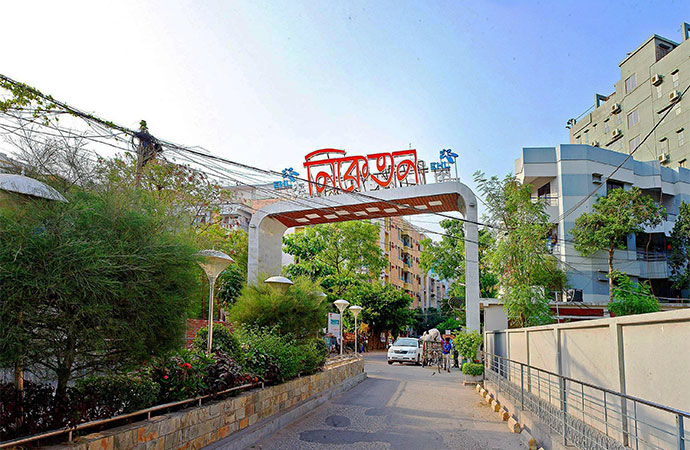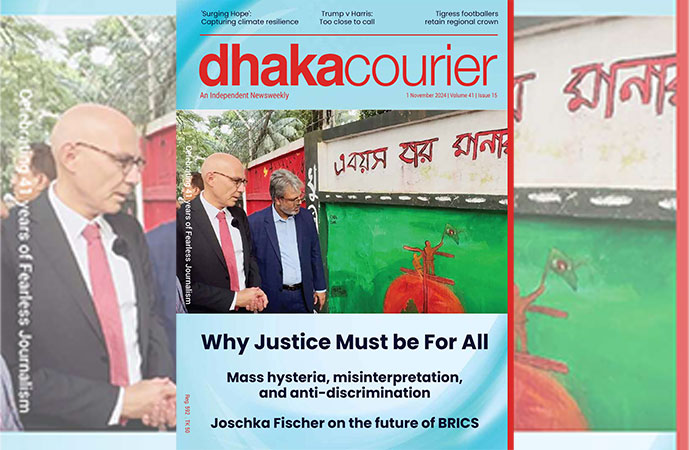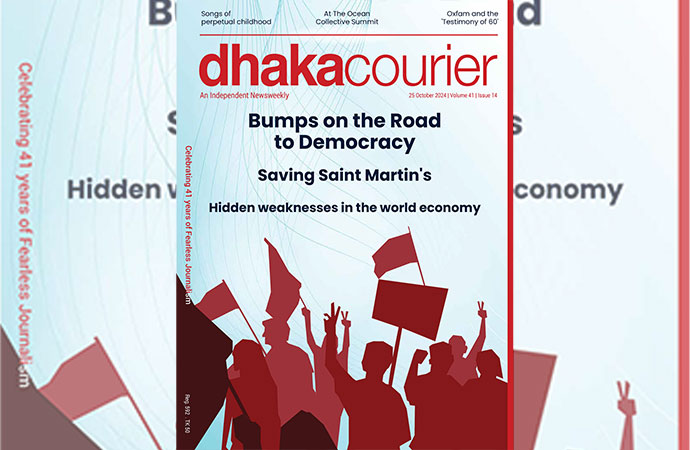Column

Photo: Collected
As I walk into the "lesser' parts of the city, the world of alleys and tiny pathways sneaking upon each other, a world opens up which I hadn't encountered as close as I do now. Perhaps I am smarter so I do.
I am still battling, still fighting for my objectives and causes, real and phantom- but somehow the world I had been part of now seems a bit tepid for my taste. And the ancient ailment that I never belonged anywhere blares all the time. What's the use of a crazy quilt city if you can recognize yourself?
Every few years we reset our clocks and hurriedly sweep aside the previously held torn volumes and hold on to a new edition of the same book. And we are thrilled at the idea that it's a whole new book we hold in our all too eager hands. But we are still not sure what the book says.
The alleys of the city without walls
Dhaka lives in the alleys, not the traffic jammed main roads, it seems. Yes, some alleys are oh-so-nice and most are not so hurling so called roads that are more like the jaws of dogs gone in the teeth, a compromise between broken molars and useless growls. Yet that's where most live, an agreement to stay alive.
There is something terribly stubborn, almost maniacal about the desire to stay alive by the denizens of this city. As if the city condemns all to eternal life even if it's for a few moments to many years. We can't call it a brave life or a resigned walk to death but a dance with the shadows that alleys of all kinds breed so well.
So I walk among the alleys and am always surprised by their commitment to the production of sublime chaos. The chaos is very obvious but the desire to go on producing is no less.
I walk and I rickshaw them, hugging close to the lairs of the denizens which is where the Buddha sits, metaphorically speaking. It's not in the substance but appearance that the truth lives on. And nothing is more apparent than this reality when one goes and listens to the sounds and sights of the alleys
Inside the bowels of Niketan bazar
I had gone there past the gates that hold Niketon safe from the lesser classes living outside on the "Bazar gate "side as people say. One walks through a gate, an opening really, which is again split into arrival and departure sections. The crazy human traffic at the gate makes entries and exits slightly longer than a second and then one meets half made roads, rain puddles and shops of all kinds and more on the other site of the world. A madrassa advertises itself on a festoon as does a courier service and on and on the shops are of every kind from BKash to medicines to pastries and street food of Dhaka's lower end side.
I picked up some street snacks when the air was suddenly peppered by rain drops. First, a little tentative and then more robust streams followed. The street food cart vendor owner asks me to come and sit in his shop next to it till the rain passes. It's still blazing sunshine outside as a reluctant rain falls. I take a bench and look at the street. I suddenly notice a tiny narrow sub alley that sneaks out from the alley into a world of its own.
These are half made, half built one or two stories-a few three- constructs that house people in. They are dwellings, abodes, homes etc but not buildings and few concrete efforts can be seen anywhere. The narrow alley is probably two humans wide and the children playing on the alley way don't hide behind much clothes.
"Why don't people take over the area and build tall buildings and rent them out? No shortage of mastans here and Dhaka land is so pricey?"
The owner smiles watching the paltry rainfall, unimpressed by its efforts. "No roads, no openings to any other area and no way to build except demolish it all. The owners took over when land had no worth but they have not sold because there are no buyers. So they let it be and build those shanties which have cost them little and rent it out."
"How much do they get for those shanties for God's sake."?
"They get 4 thousand per room, each has about 10 rooms because it's just 2 beds with very little space. 40 thousand per floor and on the second floor, another 40 thousand. Several have the third floors, that's 1.20 per month at no investment. Why should they build? They are just collecting rents and leaving it for their children to decide what to do with it."
"Rent is that high"?
He smiles. "The rent of this tiny shop that you are sitting in costs 15 thousands". Dhaka's poor also have their own economic challenges to deal with. We talk more about the area and a slow map fills the air of the alleys and by-lanes on which Dhaka lives as the reluctant rain dwindles down and I pay and walk away to catch a rickshaw home.

























Leave a Comment
Recent Posts
In stormy seas, they steadied ...
As the interim government of Nobel Laureate Prof. Muhammad Yunus compl ...
Why the Munia Murder case must ...
It was late in the afternoon of April 26 in 2021, just after 3pm, that ...
Bangladesh and India are preparing for a high-level ..
Dr Yunus sees ill-efforts at home, abroad to make go ..
Desired elections on completion of necessary reforms ..
Pope Francis has called for an investigation to dete ..